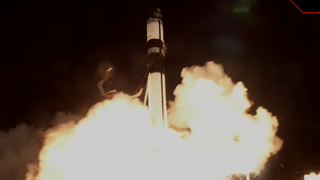Rocket Lab launches wildlife tracking satellite into space
The Rocket Lab mission, nicknamed 'It Argos Up From Here' lifted off Friday (Oct. 7) at 1:09 p.m. EDT.

Rocket Lab launched a wildlife data-collecting satellite to space Friday (Oct. 7) in a flawless New Zealand liftoff.
The mission, nicknamed "It Argos Up From Here," flew to space from Rocket Lab's New Zealand site on the North Island's Mahia Peninsula at 1:09 p.m. EDT (1709 GMT or 6:09 a.m. local time Oct. 8).
A livestream from Rocket Lab showed the kick stage successfully separating from the rocket, and the company announced satellite deployment success on Twitter at 2:06 p.m. EDT (1806 GMT).
The mission used an Electron rocket to loft the satellite and its payload, made by General Atomics, into orbit. While Rocket Lab aims to make Electron fully reusable, the company did not plan to repurpose the booster on this occasion.
Related: Rocket Lab plans another helicopter catch later this year
Once deployed, the data-collecting payload on the satellite will gather information from sensors that are used as a part of the National Oceanic and Atmospheric Administration (NOAA) cooperative data and rescue services program, General Atomics officials said in a release.
"Argos is an international program that collects data from thousands of sensors and transmitters located around the world," officials wrote. "Currently, data is collected and distributed for use in numerous applications, including ocean buoy tracking, wildlife and fishery monitoring, and maritime security, as well as non-environmental uses."
Get the Space.com Newsletter
Breaking space news, the latest updates on rocket launches, skywatching events and more!
The wildlife tracking program is what Argos is best known for, especially for sea turtles and marine mammals, Rocket Lab officials wrote in their press kit for the mission. "There are currently 22,000 active transmitters around the world that the Argos system is monitoring, with almost 7,800 tracking wildlife," officials wrote.
"It Argos Up From Here" is Rocket Lab's 31st Electron mission and the first partnership between Rocket Lab and General Atomics, according to Rocket Lab. The company's last launch on Sept. 16 lofted the Strix-1 satellite on behalf of Synspective.
This story was updated at 2:40 p.m. EDT with news of the successful satellite deployment.
Follow Elizabeth Howell on Twitter @howellspace. Follow us on Twitter @Spacedotcom or Facebook.
Join our Space Forums to keep talking space on the latest missions, night sky and more! And if you have a news tip, correction or comment, let us know at: community@space.com.

Elizabeth Howell (she/her), Ph.D., is a staff writer in the spaceflight channel since 2022 covering diversity, education and gaming as well. She was contributing writer for Space.com for 10 years before joining full-time. Elizabeth's reporting includes multiple exclusives with the White House and Office of the Vice-President of the United States, an exclusive conversation with aspiring space tourist (and NSYNC bassist) Lance Bass, speaking several times with the International Space Station, witnessing five human spaceflight launches on two continents, flying parabolic, working inside a spacesuit, and participating in a simulated Mars mission. Her latest book, "Why Am I Taller?", is co-written with astronaut Dave Williams. Elizabeth holds a Ph.D. and M.Sc. in Space Studies from the University of North Dakota, a Bachelor of Journalism from Canada's Carleton University and a Bachelor of History from Canada's Athabasca University. Elizabeth is also a post-secondary instructor in communications and science at several institutions since 2015; her experience includes developing and teaching an astronomy course at Canada's Algonquin College (with Indigenous content as well) to more than 1,000 students since 2020. Elizabeth first got interested in space after watching the movie Apollo 13 in 1996, and still wants to be an astronaut someday. Mastodon: https://qoto.org/@howellspace
